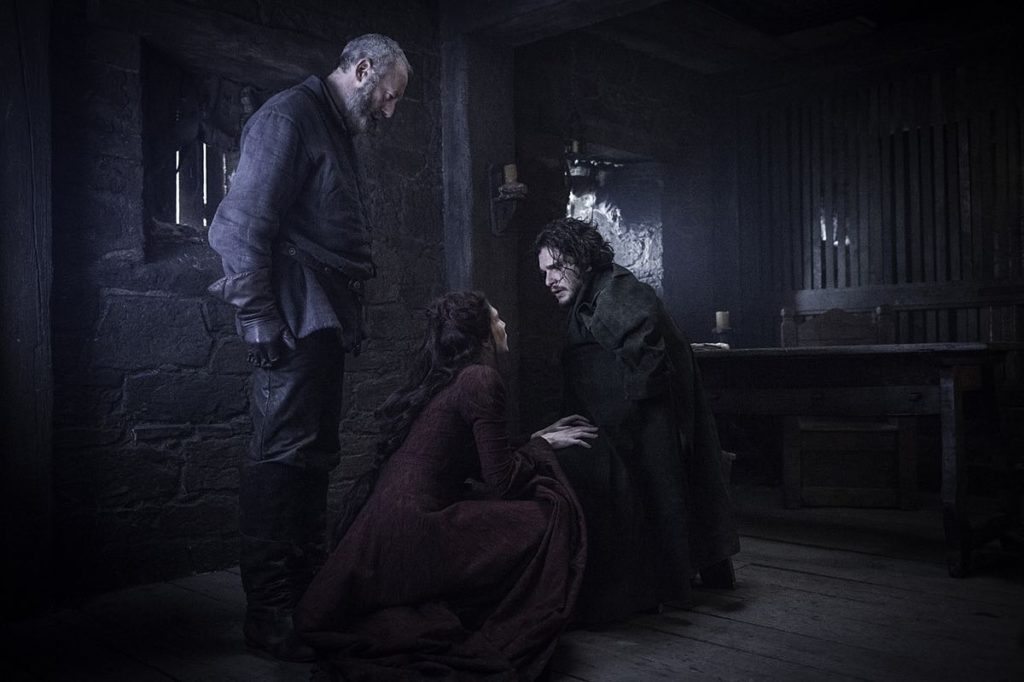
Eight days remain until the premiere of season 7, and today in our Memory Lane, we’ve reached Oathbreaker. The episode sees the return of multiple Starks- Jon, Rickon and the late Ned in flashback- and the realization of the Tower of Joy, a scene that fans have waited twenty years to see. But of course, episode three was just a tease of the Tower…Guiding us through the journey today is another Watchers on the Wall regular and familiar face in Memory Lane, Jared Kozal! – Sue the Fury
When Jon Snow fell to the mutineers’ knives at the end of Season 5, most viewers fervently believed that he would return – with good reason. The character was too important, and the great potential of his destiny as an avatar of ice and fire had yet to be fulfilled. But the immediate aftermath of Jon’s resurrection derives its power not from the promise of his newly-renewed future, but from the raw reality of a man processing his own murder, an extraordinary and brutal development even in such an extraordinary and brutal world.
“Oathbreaker,” directed by Daniel Sackheim and written by David Benioff & D.B. Weiss, sees almost all of its characters being broken and challenged. But it also finds them starting again, gathering up the pieces of their old lives and forging something new, for good or for ill.
The episode opens on Davos, scarcely daring to believe his eyes as Jon slowly rises into a sitting position. The way this scene is lit, framed, and shot evokes the idea that Tormund later gives voice to – that Jon is some kind of god, the Man Who Returned From the Dead. But whatever else Jon is now or may be in the future, he remains a mortal man. And when he looks down, he sees the proof – evidence of his assassination on his own body. He touches his scars – they’re real. The memories come flooding back. Traitor. Daggers in the dark. For the Watch.
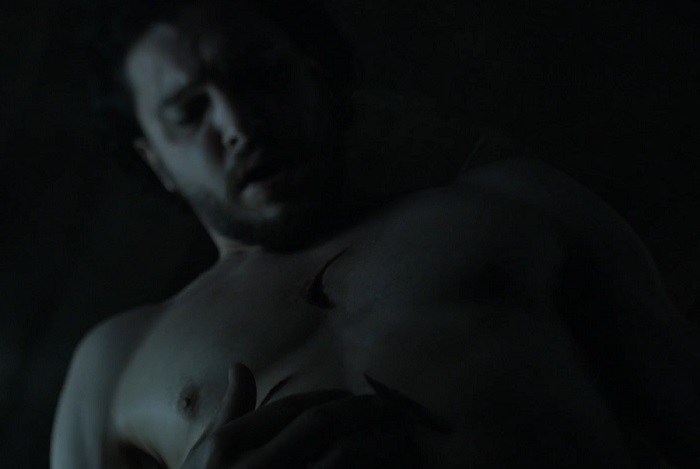
Shock and horror spread across Jon’s face. His breathing becomes shallow and panicked. In all the time we’ve known him, we’ve never seen Jon look this unambiguously terrified. He tries to stand and collapses. Davos catches him as he falls, then asks him what he remembers. “They stabbed me,” Jon whispers, still wracked by disbelief. “Olly … he put a knife in my heart.” He looks up at Davos, and he appears completely lost. “I shouldn’t be here.”
Melisandre enters, stricken with awe. She did this, but she has no idea how – only that amidst despair and doubt, the Lord of Light answered her at last. Eagerly, she asks Jon what he saw when he passed to the other side. But the only answer that he has for the Red Woman is the same one that Beric Dondarrion gave her many years ago. “Nothing. There was nothing at all.”
This may not be what Melisandre wants to hear, but she began the season as a broken woman, and now that her faith has been rekindled, it will not be easily doused again. “The Lord let you come back for a reason,” she declares. “Stannis was not the Prince Who Was Promised, but someone has to be.”
Prophecy. Destiny. These are heavy burdens to lay upon a man who can barely stand. Davos recognizes this, and wisely asks Melisandre to leave. When he addresses Jon, his words are less grand, but far more effective. He knows that Jon has to go on, and keep fighting to make the world a better place. But Jon is shattered. He did what he thought was right, and he got murdered for it. “I failed,” he says, and his gaze falls. In this moment, perhaps he wishes that he could lie back down on the table and return to the darkness. But Davos gives him strength. “Good!” he tells the Lord Commander. “Now go fail again.”
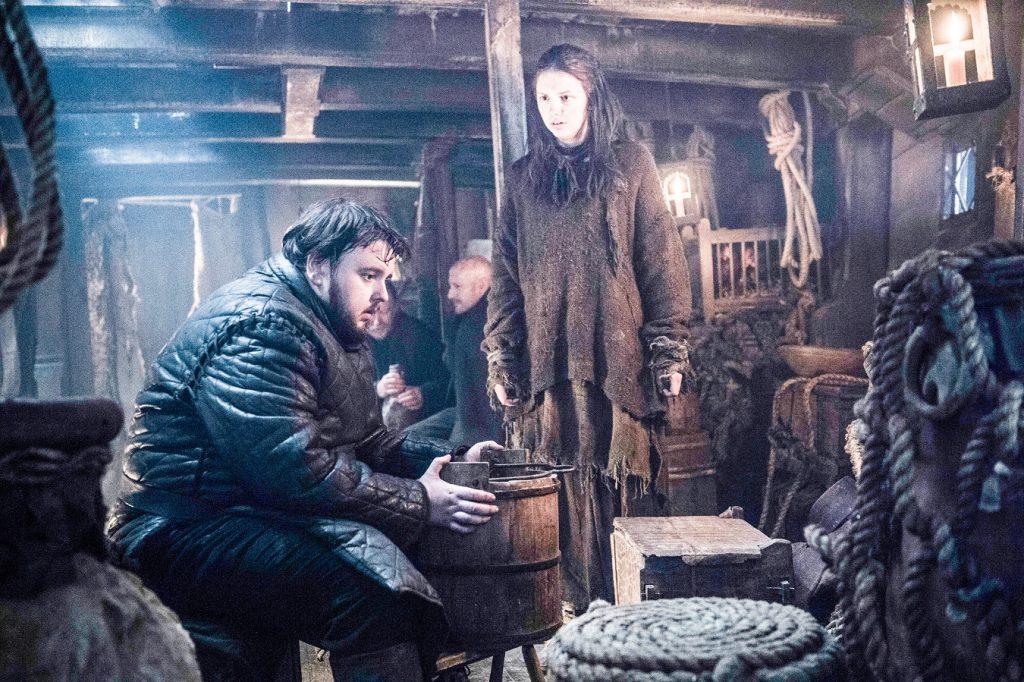
As ever, the Onion Knight’s wisdom is simple, but elegant. It’s not much, but it’s enough – for now, at least. So Jon begins his return to the realm of the living by descending into the Castle Black courtyard, where he’s greeted by awe, fear, and reverence from the assembled wildlings and black brothers. But his friends Tormund and Edd greet him with something far more valuable – warm embraces, and good-natured jokes. And so the solemn nature of Jon’s return from the dead is broken with much-needed laugh.
In the Narrow Sea, Jon’s dearest friend Sam is facing far more commonplace fragilities – seasickness, and anxiety about the future fueled by fears from his past. Sam ostensibly left the Wall to become a maester, but his primary concern was to ensure that Gilly and her son were safe. He intends to bring Gilly to Horn Hill, where his father Randyll Tarly rules. Sam has proven to be courageous and honorable, but the prospect of once again facing the man who broke him and sent him to the Wall is clearly terrifying. Nevertheless, he’s willing to ask Randyll to take Gilly in so that the people he loves most can be safe, even if it means abandoning the spirit of his oath to protect the realm and everyone in it. This perspective may seem selfish, but as Aemon once observed, what is honor compared to a woman’s love? What is duty compared to the feeling of a newborn son in your arms, or a brother’s smile? Or a promise to a sister …
![GOT_MP_092815_EP603-3862[1]](https://watchersonthewall.com/wp-content/uploads/2016/05/GOT_MP_092815_EP603-38621-1024x682.jpg)
And so we cut to perhaps the single most-anticipated scene in the history of the show (well, the first half of it, anyway). Bran and the Three-Eyed Raven visit the final days of Robert’s Rebellion to witness Ned Stark, accompanied by Howland Reed and four others, ride up to the base of the fabled Tower of Joy. There, they are met by two knights of the Kingsguard – Lord Commander Gerold Hightower, and Ser Arthur Dayne, the legendary Sword of the Morning.
Dayne smiles resolutely. “I wish you good fortune in the wars to come.” He dons his helmet, and readies himself for battle. “And now, it begins.”
“No,” Ned says, his voice tinged with sadness but laden with determination, “Now it ends.”
The duel commences. It is, in a word, magnificent. Dayne is an artist, and Ned fights with the ferocity of a man possessed. But for Bran, this story he grew up hearing a thousand times doesn’t seem to be following the beats that he expected. “He’s better than my father,” he correctly assesses as Dayne, wielding Dawn in one hand and a second sword in the other, wounds Howland and takes on Ned and three others at once with ease, effortlessly cutting them down one by one until only Ned is left. “Far better,” the Three-Eyed Raven agrees.
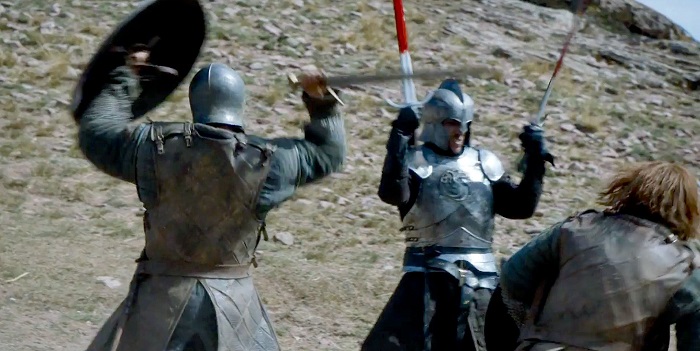
Indeed, Ned seems to be on the verge of death when Howland rises and drives his dagger into the back of Dayne’s neck. The Sword of the Morning falls to his knees, choking on his own blood. He glares at Ned ruefully, and Ned seemed agonized that it came to this. Bran is openly appalled – the illusion is broken. What remains is the harsh truth. “He stabbed him in the back.”
Once, it would have seemed unfathomable that Ned would condone, let alone participate in, such an action. But just as love is the death of duty, it is also more important than honor, especially when the stakes are this high. So Ned picks up Dawn and strikes down the now-unarmed Arthur Dayne, ending the life of one of the most revered knights the Seven Kingdoms has ever known. And then, from high above in the tower, Lyanna screams. Ned races towards the steps. Bran calls after him. “Father!”
Ned turns around. He sees no one, but the Three-Eyed Raven’s agonized expression all but confirms that Bran possesses the power to transcend the seemingly ironclad laws of time and affect the past. Shaking off the eerie moment, Ned enters the tower. Bran moves to follow him … and the Three-Eyed Raven stops him, pulling him back into the present day.
“Why did you do that?” Bran demands furiously, perfectly articulating (minus a few choice swear words) the frustrations of every single person watching at home, screaming at their television.
Once again, the Three-Eyed Raven warns Bran about the dangers of remaining in the past for too long. But now that Bran has glimpsed what’s possible, he has no desire to return to his own broken body, slowly learning the answers to obscure questions. He fixates on the only question that he and the audience want answered at this precise moment. “What’s in that tower?”
In time, the truth we all suspected even then will be confirmed: the man who began his second life at the beginning of this episode began his first in that very tower. But that time is not now, and the full implications of that reveal have yet to be reckoned with. After all, a Targaryen alone in the world is a terrible thing …
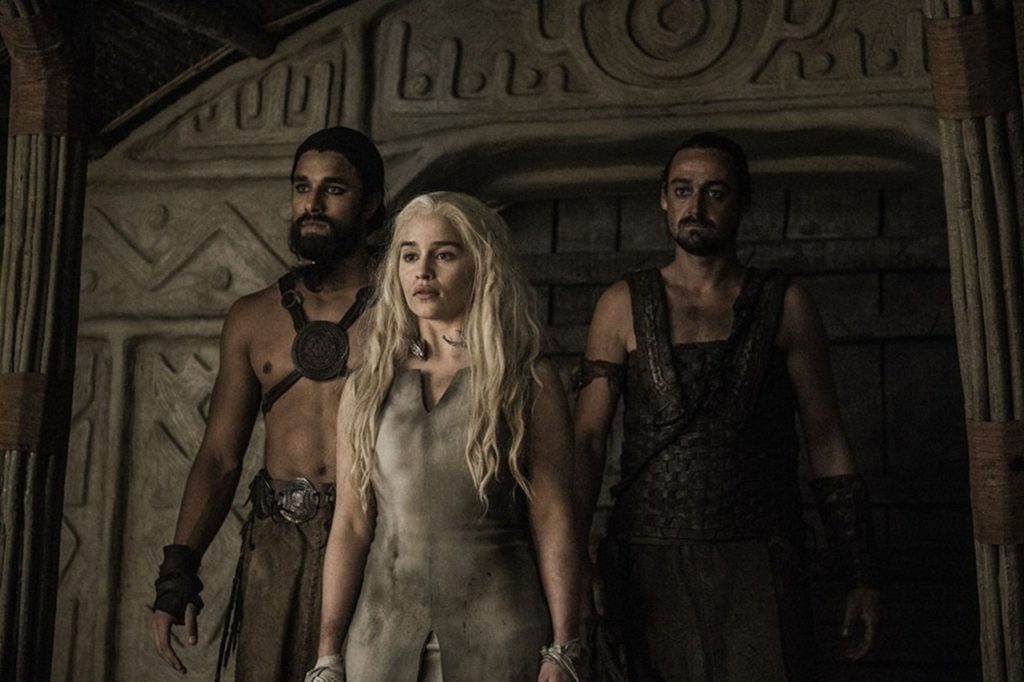
Another Targaryen presently alone in the world is Daenerys, who is brought to the Temple of the Dosh Khaleen and immediately stripped both of her clothes and the idea that her long list of titles affords her any respect here. For Dany this is merely a setback, but it’s meant to represent a permanent end to her ambitions. The High Priestess espouses the belief that Dany’s idealism simply hasn’t yet been broken by cold reality; Dany isn’t the first Khaleesi who thought she would one day conquer the world. None of the women who now reside in the temple wished to live out their days as widowed prophets offering counsel and omens to the rampaging Khals. They all had greater ambitions for their lives. But those dreams have been taken from them – they may not be broken, but they are resigned to their fate. Dany, however, is neither broken nor resigned. She knows what she wants, and she’s already working on a plan.
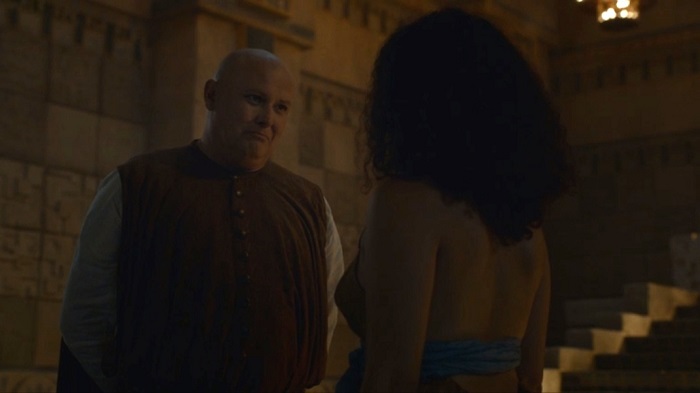
In Slaver’s Bay, Varys has a plan of his own – he intends to break Vala, the young Meereenese prostitute who has been conspiring to kill Dany’s soldiers. The Spider forgoes torture, but he’s ruthless in his own way, and while Vala is committed to her beliefs, they are not the most important thing in the world to her. Varys has already located Vala’s weakness: her young son Dom. He would never directly harm a child, but Vala herself is another matter. “How will poor Dom get on without his mother?” the Spider muses, “And with his breathing problem …”
This naked threat splinters Vala’s spirit of resistance. Varys offers her a lifeline – reveal who funds the Sons of the Harpy, and she and her son can receive a new life in Pentos, along with a heavy bag of silver. Vala complies, confessing that the Masters of Astapor, Yunkai, and Volantis are supporting the insurgency. Armed with this information, Grey Worm and Missandei believe that violence is the only recourse, but Tyrion is more skeptical, believing that diplomacy can work. Tyrion asks Varys if his little birds can deliver a message …
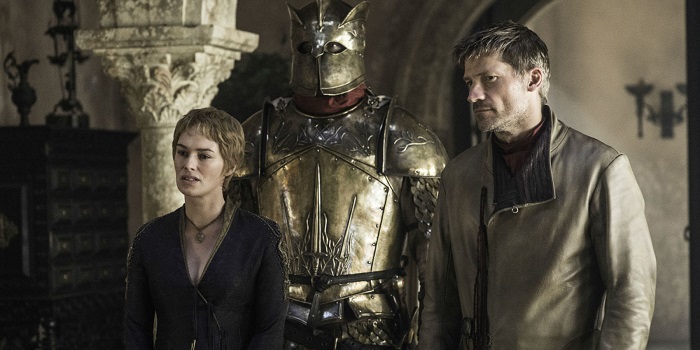
In King’s Landing, Qyburn has recruited Varys’s (former?) little birds into Cersei’s service. Cersei endured her Walk of Atonement and the death of her beloved daughter Myrcella, but she wasn’t broken by her traumatic experiences – she was hardened by them. Her hatred and desire for retribution against her enemies give her focus, and she and Jaime are set on taking back all that was taken from them. “If someone is planning on making our losses their gains, I want to hear it. If someone is laughing at the Queen who walked naked through the streets covered in shit, I want to hear. I want to know who they are. I want to know where they are.”
Still, Cersei doesn’t yet possess the raw power necessary to force her way back into the highest spheres of influence. When she and Jaime attempt to establish themselves on the Small Council, Kevan Lannister and Olenna Tyrell decide to take their ball and go home. It’s another setback, but Cersei has suffered far worse recently. This won’t deter her for long.
Cersei’s son Tommen attempts to exert his influence as well when he goes to visit the High Sparrow. But unlike his mother, Tommen is fragile, easy to break. The High Sparrow senses this immediately, and seizes his opportunity. The King of the Andals and the First Men walks right into the trap. Tommen may not fully realize it, but his half-hearted attempt to climb the ladder is already doomed, and the eventual fall will leave him broken at the foot of the Red Keep.
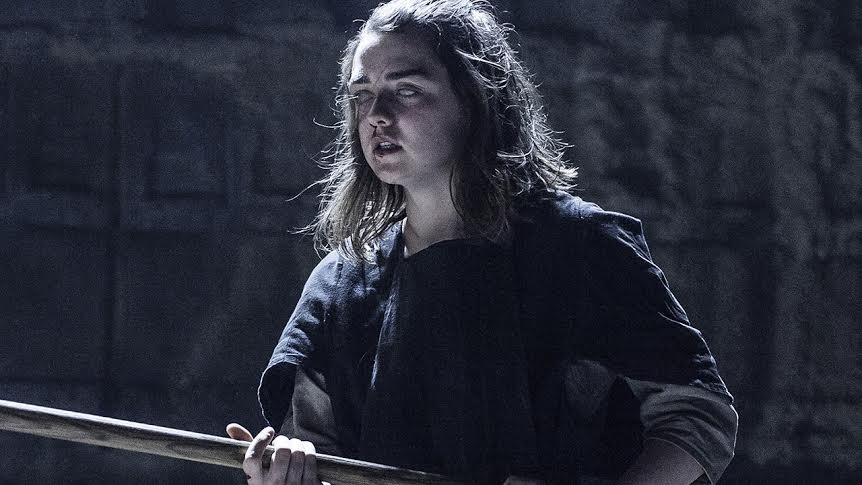
Arya Stark isn’t quite so easily broken, but after losing her sight and spending weeks being beaten in the streets, the relentless trauma of her training is exacting its toll. When the Waif isn’t bloodying her with a staff, she forces a girl to examine Arya’s past life from the perspective of someone who is no longer tied to it. Arya’s family (all dead, or lost to her). Arya’s list (now surprisingly short). Arya’s feelings about the Hound (despite her prior denials, she did not hate him by the end). “She sounds confused,” the Waif sneers. “Yes,” a girl responds. “She was.”
Arya sounds broken in that moment. But a girl is resilient, and she is learning. She manages to strike the Waif, and then blocks her rival’s furious retaliatory attack, proving that she has learned how to fight without relying on her eyes. Jaqen approves, and he leads her to the pool, inviting her to drink. “If a girl is truly no one, she has nothing to fear.” Arya drinks, and her vision is restored. “Who are you?” A man asks. “No One,” a girl declares. For the first time, it doesn’t completely impossible that she might be telling the truth. Or perhaps she’s learning how to play the game of faces at last …
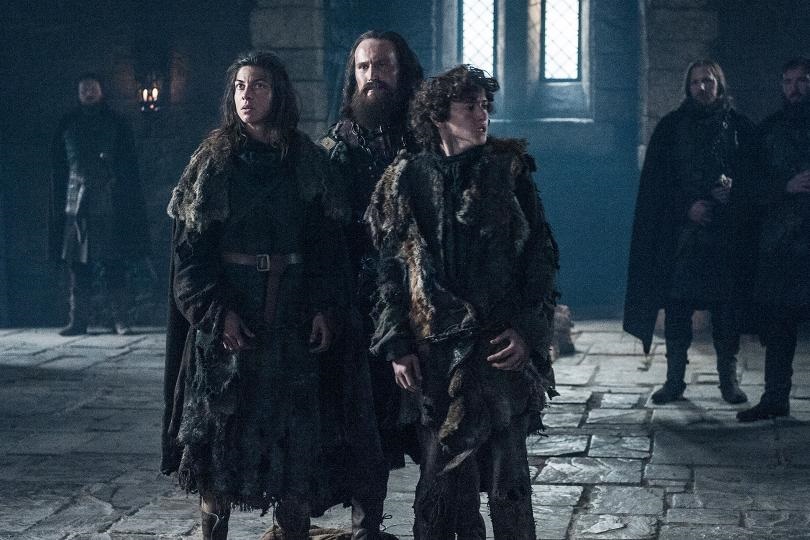
As one Stark possibly renounces her name, another is in dire peril. At Winterfell, Ramsay receives a contingent from the Last Hearth, now ruled by Smalljon Umber, the deceased Greatjon’s son.
Crueler and more practical than his father, Smalljon doesn’t consider words of fealty to be as valuable in binding rival houses together as shared interest. What he can’t cast aside, however, is his bone-deep, lifelong hatred of the wildlings that have raided his family’s lands for generations. And while Smalljon may be willing to abandon his past allegiance in favor of ruthless realpolitik, he isn’t exactly brimming with affection for the new Warden of the North either. Ramsay suffers this disrespect with a surprising degree of restraint, but he cannot agree to the Smalljon’s request to join their forces without some token of fealty. “Fuck kneeling,” Smalljon declares, “And fuck oaths. I’ve got a gift for you.”
He brings in two figures, hooded and trussed. Our fears are confirmed when the figures are unmasked and revealed to be Rickon Stark and his fiercely devoted protector, Osha. Ramsay asks for proof of Rickon’s identity, and Smalljon obliges by bringing in the head of Shaggydog. House Stark, already devastated, has suffered another grievous wound.
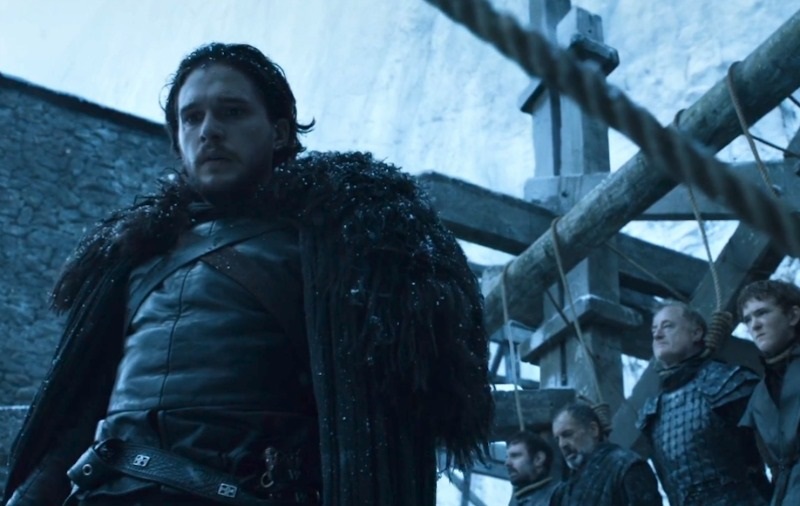
At Castle Black, Rickon’s half-brother Jon sits quietly before the fire, holding the black Night’s Watch vest he wore on the night he was killed. It’s still stained with his blood and riddled with holes where the knives punched through the leather and into his flesh. When the time comes for him to avenge his own murder, Jon confronts the four surviving mutineers and asks for their final words: Bowen Marsh is entrenched in denial. Othell Yarwyck attempts to bargain. Alliser Thorne accepts his fate. His final words convey no remorse, but perhaps a hint of prophecy. “I fought. I lost. Now I rest. But you, Lord Snow, you’ll be fighting their battles forever.”
Olly says nothing to Jon. Jon says nothing to him. Some wounds can never be healed.
Jon prepares to carry out the sentence, but hesitates. He stands still, remembering the way the knives felt as they plunged into his body, the way he bled out onto the frozen ground. Jon’s face darkens. His heart hardens. He brings his sword down, sending the mutineers into the all-consuming darkness from which he had only just returned. Jon watches them die, quivering with suppressed rage as the mutineers twitch, choke and finally grow still.
Edd suggests that they burn the bodies – now that justice has been meted out, he expects things to return to normal. But for Jon, things can never truly be normal again. He hands Edd his cloak, and then he hands him command of Castle Black. Everyone watching, wildlings and crows alike, is stunned. But Jon, who has been hesitant and unsure ever since his return, finally seems to have settled on the one thing he knows, or at least that he wants, to be true. “My watch is ended,” he declares, and strides out of the courtyard towards an uncertain future.
Did Jon break his oath? Some may see it that way. For others, his debt to the realm and to the Watch has been satisfied by his death. But right now, Jon isn’t interested in anyone’s perspective but his own. Burdened with the certainty that he faces neither reward nor punishment if he should he fall again, only the prospect of eternal nothingness, he intends to live his second life as he never lived his first: for himself. Fortunately, hope and a new purpose are on their way to Castle Black, and while an unquestioning obligation to duty no longer rules the former Lord Commander’s heart, the promise of family and home will soon spur him to answer the call.

Introductions: In the present, we meet the High Priestess of the Dosh Khaleen (Souad Faress), the young Lhazareen khaleesi Ornella (Hannah John-Kamen), and Smalljon Umber (Dean S. Jagger). In the past, we encounter three legendary figures from Westerosi history – Ser Arthur Dayne (Luke Roberts), Lord Commander Gerold Hightower (Eddie Eyre), and Howland Reed (Leo Woodruff) – as well as the young adult version of Ned Stark (Robert Aramayo).
Deaths: Alliser Thorne, Bowen Marsh, Othell Yarwyck, and Olly are repaid for the treacherous murder of their Lord Commander with execution by hanging, courtesy of the man they had (temporarily) assassinated. Shaggydog, Rickon’s loyal direwolf, is discovered to have been killed by the Umbers. And in the past, we witness the deaths of Arthur Dayne and Gerold Hightower, as well as all of Ned’s Northern compatriots save for Howland Reed.
BeautifulDeath: Alliser Thorne and the mutineers

Sandor!
Not yet
Jared:
That was incredibly well-written! You vividly described the action and conveyed the emotions the characters were experiencing.
King Stannis would be proud. I can picture him saying to you:
“I reward men for eloquence, I don’t punish them.”
“Kneel before me, lay your sword at my feet, pledge me your service, and rise again as Jared Kozal, Lord of Winterfell.”
Beautifully summarized!!!
There was nothing dishonourable about what happened there, despite what the writers of the show seem to think. It was not a duel, it was a melee in actual combat. There’s no expectation in wartime that people will fight each other one-on-one and only face-to-face.
I quite liked Thorne’s final speech, though I was disappointed we didn’t get any kind of initial reaction from the mutineers to Jon’s return.
Jon: “I failed.”
Davos: “Good…now go fail again!”
Thx for the reminder. Words to live by. Davos is amazing. One of the best lines of the season, imho.
Once again, Bran’s reaction to visions of revisited history, shaking his core, was fantastic to witness. BR pulling Bran back from his intense curiosity (at both WF and ToJ) was intriguing.
You guys have no idea how many times I watched the promo for this episode that week lol.Anyway it was a really good episode.Loved it.I hope Jon gets more hugs in season 7.I love it when he hugs people.
I fully agree. The writers’ conception of honor is extremely odd. What is Howland meant to do, let Ned be killed ? Or is Ned meant to let Arthur suffer after Howland stabs him, because it would be dishonorable to kill him at that point ?
Howland is completely justified in saving Ned’s life, and Ned is completely justified in killing Arthur.
If the honor rules were that strict, maybe fighting them 5 on 2 was already a dishonorable thing.
Also, it is unfortunate that Gerold Hightower is absent, given that his entry in the book of brothers is shown in S04E01, and it clearly says that he was slain in the Red Mountains of Dorne, along with Arthur Dayne and Oswell Whent.
Yet another instance of sloppiness, unfortunately. Seems like the keeper of the continuity has been slacking off.
Haha I won’t forget this one… On Monday, I came home so incredibly exhausted that I decided to delay the episode for next day. Again, sharing a humble writing from Lord Parramandas’s history lore.
Lord Parramandas’s third review with a bit of delay, written on May 10th 2016:
I’m a bit late with my review because yesterday after spending six hours in laboratory for organic chemistry, I was simply too exhausted to watch the episode. Well, here are my brief thoughts:
The Tower of Joy: Gods… This was the scene I watched on Youtube before watching the whole episode. And then I watched it again… and again… and again… and again… Absolutely amazing. I’m glad that they cut some book dialogue and even more glad that they added “Where is my sister?”. I don’t care if ser Oswell was absent and I don’t care if Dawn was just an ordinary sword. I was really skeptical about dual-wielding but it was surprisingly convincing for me. All three actors’ performance was great. Ser Arthur was stern and serious, ser Gerold more wild, young Stark more energetic than his older self. Also, I noticed that ser Arthur’s line was the same as the one Mance gave to Stannis.
The Wall: Expected, but nicely done. “I fought and I lost. Now I rest.” – One of my favorite lines. I’m glad that the mutineers were given a clean death. Those vile comments on Youtube about how Olly should have died were really unpleasant to read. The boy is no Joffrey or Ramsay, just a kid who saw his family being slaughtered and who developed intense hatred for the wildlings. Marsh was a coward and Yarwyck was more worried about his reputation. But ser Alliser… “I fought and I lost. Now I rest.” -Owen Teale’s performance was amazing in every episode he appeared and his version of ser Alliser was far more complex than his book counterpart. I will really miss him.
King’s Landing: So, the little birds aren’t mute. I really like the fact that a certain Kingsguard was named ser Gregor on the screen. And it was nice to see Olenna and Kevan again. I have a feeling that a storm is on horizon…
Meereen: Still nothing special but the apperiance of Vala surprised me a bit. And it was nice to hear her name, so I can fix it on my “character apperiances” list. And apparently Yunkai and Astapor along with Volantis are responsible for the chaos… So the Great masters of Meereen had nothing to do with it.
Vaes Dohtrak: Much bigger than in season 1. I liked the scene with the High Priestess. Daenerys was the one who broke the rule in the first place.
Braavos: I like the fact that the Waif is getting more screentime than Jaqen. I hope we see more of her. But it is almost clear that she hates Arya. Is she the one on the list?
Sam and Gilly: I noticed that Gilly is more attractive now. And her child got bigger.
Winterfell: R.I.P Shaggydog. So the wildlings were a reason after all. I’m glad that they didn’t recast Rickon but I fear for his future and even more for Osha. Great performance by the actor who plays Jon Umber. And his father apparently perished…
I really missed Sansa but I’m sure we will see her next week.
So what rating shoud I give this episode and where on my ranklist should I put it? It was a quiet episode, but Tower of Joy really left an impression. I think I will put it on rank 23 among my lower 9 star episodes, preceeded by Fire and Blood (rank 22) and followed by Garden of Bones (rank 24).
Side note: I didn’t have time to read all the comments on this thread. I hope you do not mind.
This is the next episode on my list when it comes to my current rewatch.
Markus Stark,
According to the actor playing the second knight, he was Gerold Hightower, not Oswell Whent.
Loved this episode and as usual Jared you managed to express my feelings about it completely! I do wish there was more of a reaction from the watch about his resurrection but I suspect they didn’t have time to bring any more up (that being said, we do not know how many days have passed while Jon got his strength back so much might have been happening behind the scenes.)
Shaking my head at Mels cluelessness and short sightedness – asking about what he saw probably was not what he needed to be asked at this point and glad that Davos asked her to leave. We all probably wanted to know that answer, but really, the man just came back to life, give him a few moments (and besides just because he saw nothing doesn’t mean nothing was there…..)
Sean C.,
I don’t think there was a question of that. Its that Bran has grown up with his father’s legend, and Ned never says thats not the way it happened. That had to be a bit of a blow to him.
1. I “half agree and half disagree.” Obviously, in a fight to the death “honor” goes out the window. (I’m reminded of Bronn “stand[ing] for the dwarf” at the Vale. Lysa: “You don’t fight with honor!” Bronn (motioning to his vanquished opponent) replies: “He did.”)
However, I remember a scene in S1 in which Ned was getting on Jaime’s case for stabbing the Mad King in the back. (Hypocrisy, anyone?)
Also, I interpreted a large part of Bran’s reaction (“He stabbed him in the back!”) as shock that the story he’d heard “a thousand times” and accepted as historical fact – that his father “beat” Arthur Dayne – was complete hogwash.
2. I suppose one could say that every aspect of Jon’s resurrection was surprisingly treated low-key. It would’ve been cool to have a shock and awe scene like Dany’s Khal BBQ when she walks out of the burning building and all of the Dothraki outside, duly impressed, bow down.
One mutineer on the gallows did say “You shouldn’t be here.” Tormund did say the Wildlings think Jon is “some kind of a god” – before launching into his small pe*ker joke.
I’m not sure why we didn’t get more “WTF!!!??” reactions by the mutineers upon seeing their dead as a doornail murder victim walking around as if he’d merely had to deal with a pesky hangnail.
No, according to the writers in the BTS video, they consider what happened to be dishonourable and contrary to the code Ned lived by.
No, not in the least, as the situations aren’t even slightly equivalent.
What Jaime did was what people mean when they use “stab in the back” as a pejorative. Jaime was on Aerys’ side, sworn to serve him, Aerys was unarmed, and Jaime slew him in a betrayal of his chivalric oaths.
What Ned and Howland did was fight an enemy in a melee. Dayne was not unaware that Howland was an enemy and trying to kill him, he simply miscalculated in thinking Howland wasn’t a threat anymore.
That’s not wrong, but in that conversation they meant it literally too. Jaime did rhetorically ask Ned “Tell me… If I’d stabbed the Mad King in the belly instead of the back, would you admire me more?”, and I don’t think he was wrong.
Jenny,
” I hope Jon gets more hugs in season 7.I love it when he hugs people.”
________________
Nothing can beat little Arya’s leap-and-hug in S1e2.
I don’t foresee Jon and Arya meeting up in S7 (too soon after the less poignant Sansa-Jon reunion). All I ask is that it happen in S8, and when it does, that the showrunners milk it for all it’s worth – “fan service” buzzkillers be damned. I’ll have a box of Kleenex + backup on standby all season (along with a sliced onion prominently displayed in case someone walks by and sees me…)
It certainly wasn’t seen as chivalrous amongst knights in Mediaeval times to use a dagger ( I guess a sword is alright then for a backstab!) and they were expected to attack their opponents “openly and honestly”, but as has been said in a real melee situation pretty much anything goes especially to defend the life of a comrade.
Bushido says “warriors have only one judge of honour and character, and this is themselves” – which kind of cuts both ways and would mean that it’s either honourable or dishonourable depending on the eye of the beholder
Ten Bears,
Thank you! That’s very kind. It was a lot of fun to write.
I would be honored to receive such recognition from Stannis, just so long as I didn’t have burn the heart trees and pledge fealty to the Lord of Light. I’m an Old Gods kind of guy.
There’s no continuity error here. Eddie Eyre, the actor who played the second Kingsguard, has confirmed on Twitter that he was cast to play Gerold Hightower. His CV reflects this as well. That means Whent is the Kingsguard who is absent in the show, not Hightower.
https://twitter.com/EddieEyre/status/736495631762657280
I am well aware that the line that Hightower speaks in this episode – “Your friend, the Usurper, would lie beneath the ground if we had been.” – resembles the one that Oswell Whent speaks in the book (“Woe to the Usurper if we had been”). In practical terms, Eyre is playing a character that represents an amalgamation of Hightower and Whent. If I had watched the show in a vacuum, I probably would have assumed that Eyre was playing Whent, given his dialogue and his relatively young age. But the name that was given to that composite character, both in the script and via external sources, is Gerold Hightower. So that’s the name I used.
Furthermore, Gerold Hightower was still the Lord Commander of the Kingsguard in the show’s universe. Grand Maester Pycelle cites his name and his title in this very episode, as a precedent for the Lord Commander having a seat on the Small Council in which Jaime and Cersei come to speak with Kevan, Olenna, and the others (an honor that Barristan did not receive, in universe because he killed too many of Robert’s friends, and out-of-universe because the show didn’t want him to know about Jorah’s betrayal – a consequence of the whole Arstan Whitebeard disguise business being dropped).
The whole White Book business is unfortunate, but the prop masters made that, not the writers. At the time, the writers hadn’t decided how they would depict the Tower of Joy sequence. As for why there were only two Kingsguard, not three, who knows? Probably because it was logistically easier to choreograph such a complicated fight that way.
I disagree. For Ned, it won’t even matter if Jaime had given a sword to Aerys and then killed him in a duel. He is a Kingsguard and he is to protect his king. The timing of Jaime’s act was the worst part according to him. If Jaime had knocked out the mad king and surrendered himself, Ned “might” have seen him in a better light.
Sean C.,
Personally, I’m inclined to agree that what Howland and Ned did was not dishonorable. War is war. But Ned, personally, with his strong code of personal conduct and integrity, clearly thought it was dishonorable, even as he was doing it. He may be the only one who feels that way – I doubt that many others would vilify him for this, given what was at stake. Still, it’s painfully obvious that Ned did not feel good about killing such a respected knight in this manner – you can see the agony written on his face after Dayne falls. His love for Lyanna is far more important in that moment, so he takes advantage of the opportunity that Howland gave him and strikes down an unarmed man. But there’s a reason he never told Bran, or anyone in the realm, about what truly happened. He’s deeply ashamed.
The rules of war may not deem this act dishonorable. We, as the audience, may not deem it dishonorable. Most characters in the world may not deem this act dishonorable. But Ned, personally, considers the act dishonorable, and those are the values and expectations that he passed down to his son, Bran – hence Bran’s shock. And given all that Ned sacrifices later in his life to uphold his honor, particularly over the course of Season 1, it’s a surprising moment for the audience as well (perhaps not for book readers, who had long ago figured out what “He would have killed me if not for Howland Reed” truly meant). I believe that’s the dynamic that the showrunners were addressing when they talked about the scene.
Ser Not Appearing in this Series,
I have to admit, I’m flummoxed by this “fight with honor” philosophy.
At the TOJ, nobody laid out the ground rules, e.g., 2 vs. 2.
Ned didn’t protest to Arthur Dayne, “Hey! No fair! Only one sword! And no helmets!”
For that matter, Ned kind of told Arthur and his buddy, “Look, the war’s over. Give it up. The Mad King’s dead. We won. Now where’s my sister?” Arthur just pulled down his visor and said “Let’s rock.”
And I’m reminded about what Jorah said. Something like ~ “Rhaegar fought nobly. Rhaegar fought honorably. And Rhaegar died.”
Where does “fighting with honor” get you if you lose?
In fact, the TOJ scene reminded me of Karl Tanner with his two knives vs. Jon Snow at Craster’s Keep in S4e5:
Karl Tanner: “You learn how to fight in a castle? Some old man teach you how to stand, how to parry? How to fight with honor? You know what’s wrong with honor?
(Spits in Jon’s face; obscuring his vision)
But then a Craster wife stabs Tanner in the back, and Jon puts his sword through Tanner’s skull.
Everybody’s always stabbing people in the back or from behind to help out a friend: Theon vs. Bolton soldier attacking Pod; (I think) Daario vs. Dothraki attacking Jorah; Pod vs. kingsguard attacking Tyrion @ Blackwater; etc.
If you have to wait ’til you’re face to face you’re f*cked.
And while Smalljon may be willing to abandon his past allegiance in favor of ruthless realpolitik, he isn’t exactly brimming with affection for the new Warden of the North either. Ramsay suffers this disrespect with a surprising degree of restraint, but he cannot agree to the Smalljon’s request to join their forces without some token of fealty. “Fuck kneeling,” Smalljon declares, “And fuck oaths. I’ve got a gift for you.”
Bran is openly appalled – the illusion is broken. What remains is the harsh truth. “He stabbed him in the back.”
I have to say that the look on Bran’s face, the way Isaac portrayed the dismay and shock was pretty tough to take. A dramatically ruined perception about an event that was told the same way 1000 times. That helped built up the image of His father.
Bran was the child of stories. Nan was the legend holder for him and it was emphasized so many times how crucial those were for the Stark boy growing up and his perception of the world around him. And there it goes… along with the door holding, Bran seems to reshape his own house history universe at the speed of light.
And so I am actually, because I felt exactly like him both times.
Good recap. Kudos. Made me feel like rewatching this ep.
Interesting. Still, that means Oswell Whent is missing, despite having been mentioned in the Book of Brothers. Plus, he looks far too young for Gerold Hightower. Given that the same episode mentions Gerold as being LC of the Kingsguard, it is odd that he is so young, and that Arthur Dayne stands in front of him, as though he were the one with seniority.
Ten Bears,
It’s a fictional world, so (dis)honour can be anything they want it to be, and not everyone has to have the same definition…(Klingons anyone )
)
Going back to Bushido “from an Eastern point of view, dishonour is basically the same as losing face, or being shamed.”, now Howland Reed could quite rightly claim that he would be shamed and dishonoured if he had let his friend and Liege Lord die when he could have prevented it and therefore claim he acted honourably.
Ned had been fairly bested in combat and therefore could feel shamed that he allowed his bannerman to get a sneak kill, and therefore it was a dishonourable means to have his life saved ( as irrational as that may be, but House Stark is all about honour ). Ned was always vague about the events which suggests he wasn’t proud of it at least
In the gaming world there is always a huge debate about whether it’s “cheesing the AI” or “game breaking” to use god like sneak kills too.
Definitely not a black and white issue.
TormundsWoman,
Oops, no quote blocks(?) why? I know I’ve put them and then even edited them!
Jared,
What bugged me about the false account Ned allowed to perpetuate by failing to correct it, was the “stolen valor” aspect of it. Ned goes down in history as the man who defeated the legendary Sword of the Morning in single combat. Ned even lets his son buy into this malarky.
I’ve read several well-reasoned justifications for Ned’s nonsense-by-acquiescence approach, e.g., he just didn’t want to talk at all about ToJ to avoid giving any details that might lead to more questions that might endanger Jon; or he didn’t want to tarnish the reputation of his buddy Howland Reed.
If he was going to float a false account, why not just announce that one of his four comrades who perished was the hero who bravely engaged Arthur Dayne and was able to inflict a mortal wound on Arthur Daynr before succumbing to his own injuries ? Those four friends did lose their lived fighting beside Ned. It wouldn’t hurt if one of them got the hero worship instead of undeserving Ned Stark.
– Meaningless speculation rant over –
Icewalker,
I agree.
Ten Bears,
Makes for good characterisation though, here we were all led to think of Ned as a noble paragon, yet…
I don’t think that Young Ned’s companions were all “Northern compatriots”. Seems like they were dressed in a variety of Westeros regional garb. I am pretty sure that there was at least one Dornishman in the mix.
Markus Stark,
My guess is the show was more focused on getting a good fight, so they cast younger actors. Hightower’s age doesn’t really matter that much for the story, just his position as Lord Commander.
Fall of House Stork,
They were definitely Northern. It’s canon. Dorne sided with the Targaryens, so they have no reason to help Ned. It’s clear looking at their attire that they had a rough time on the road and picked up whatever resources they could find to complete their journey.
I love the difference in how the 4 mutineers react to the execution.
Marsh is just in complete shock and denial over the whole situation. Yarwyck is thinking about his legacy. Thorne is composed and faces death with dignity – I don’t even sense any animosity in his last words to Jon – rather pity. Olly though… That’s a look that says “My vengeful spirit will haunt you until the end of your days…”
Beautifully written, Jared. You could easily be the Wise One, around whom all the little children gather to hear eloquently delivered stories of the past.
I liked every bit of this episode, from Jon’s first amazed freakout as he assessed his injuries, then remembered how they came to be, to his stumble as he tries to get up. Kit did a wonderful job of showing a combination of fear, shock, anger and angst over the fact that he got murdered for trying his best. Melisandre’s look was priceless. The best line I read regarding that look came from Laura Stone at the “Hey, Don’t Judge Me…” site: Whoa, that shit worked!
I like your line about the situation, too, Jared: “Prophecy. Destiny. These are heavy burdens to lay upon a man who can barely stand.” Heavy burdens for anyone, really. How many times in our own lives have we had to either live up to prophecies put upon us by others, or overcome prophecies put upon us? Living can be hard work, as we all learn; as Jon learns time and again.
Everyone needs a Davos in their lives. The writers are at their best with their lines for him. In a few short lovely lines, he was able to convey acknowledgment, empathy, encouragement and wisdom enough to get the boy on his feet again, and start living.
Poor Sam, as happy as I was to see that he, Gilly and the baby were ok, I got a chuckle from both his discomfort and the fact that Gilly seems to be the happiest she’s ever been. She’s obviously been bouncing all over the ship, learning things from the captain, talking to everyone and just enjoying every waking moment in a world entirely new to her. Sam’s taking her to Horn Hill? I was excited to hear that, almost as as happy as Gilly going to a new place.
The fight scene was something I was looking forward to seeing just because so many on this site were so giddy about it. I loved and still love and look forward to the flashbacks. This one was pretty good, with A Dayne swinging two swords against seeming heavy odds. I won’t go into the honor business, because it’s been handled well by others on here. But I got a chuckle over Bran’s astonishment over a faulty detail in a story that had been part of his growing up. I’ve been amazed by faulty details in the family history handed down; who of us hasn’t? It seemed really cool to me that Young Ned heard Bran call out. Jared you were right in noting the BR’s grimace at the act. Apparently, in GoT, even when the ink is dry, the written past CAN be changed. Should be very interesting to see what Bran can/will do with that talent down the line.
gotta go, be back soon with my thoughts on Dany, the Dosh Kaleen and the Khals, and then Jon’s reactions to the mutineers.
Sean C.,
What is the BTS video? Didn’t see it, just commenting based on what I knew of the stories Bran knew
Icewalker,
In Ned’s eyes, Jamie let the Mountain kill Rhaegar’s children. He was never going to think well of him.
In our own American history during the Revolution, the British were appalled at the “dishonor” of our minutemen. They declared it unfit and unfair that the Americans took shots at them from the woods rather than march in a straight line in bright jackets, the way the British did. We didn’t have the uniforms, we didn’t have the men, and we didn’t have the desire or inclination to be shot down in a straight line. Were we dishonorable? As Robb said to Jaime when Jaime challenged him to a one-on-one duel, “If I did it your way I’d lose. We’re not doing it your way.”
It’s a hard question. There has to be some order to the chaos, or everything good goes asunder. There has to be some thinking, some heart applied to all actions, warfare or no. It takes a lot of thought. It’s something we all have to come to terms with.
Well done, Jared. Compliments on another great Memory Lane.
I like Oathbreaker quite a bit, though not as much as the preceding and the following episode. I’ll always remember it as the One That Didn’t Quite Do Justice to Ned’s Fever Dream.
I am usually not the one who spends much time comparing books to show as I find it a useless endeavor that so often misses the whole point: Game of Thrones isn’t and shouldn’t be a carbon copy of the book series.
That said, Ned’s dream about his confrontation at the Tower of Joy is such a hauntingly beautiful piece of writing. I am still a bit sad that the mise-en-scene and the dialogue before the battle starts are just… adequate, I guess. There’s almost none of the lyricism present in the writing with the exchange between Ned and the knights of the Kingsguard heavily truncated. I am aware that the surreal melancholy quality of the book scene was due to Ned’s feverish dream, but I’d like to believe that the director, cinematographer, and editor, with Djawadi’s help, could have staged the initial approach and the ensuing conversation in a way that preserved emotional heft as well as surrealism.
I am looking at one of my favorite Game of Thrones scenes of all time, Tyrion’s and Jorah’s passage through the ruins of Valyria*, as an example of what can be accomplished with inspired writing and a sense of place.
* They held each other close,
And turned their backs upon the end,
The hills that split asunder,
And the black that ate the skies,
The flames that shot so high and hot,
That even dragons burned,
Would never be the final sights,
That fell upon their eyes,
A fly upon a wall,
The waves the sea wind,
Whipped and churned,
The city of a thousand years,
And all that men had learned,
The Doom consumed them all alike,
And neither of them turned.
Loved this summary – thank you!
The Arya scene where she finally blocks the Waif’s vicious attack had me cheering. Seeing Arya take repeated hits was wearing me down. It seemed to me the Waif was taking and getting special privileges where taunting Arya was concerned, privileges that should have been beyond what someone who was No One would want or be able to take. I was suspicious of the Waif asking such detailed questions about Arya’s family as well. As I’ve said before, I can’t wait to see what amazing things are in store for Arya in this season. After enduring such shit all these years, she deserves something good.
Varys has his own ideas of diplomacy, and I like his much better than those of most diplomats. Vala wasn’t taking part in the killing of the Unsullied soldiers merely for money, she had a determined sense of patriotism too. However, the terms Varys gave her were pretty fair, Take your kid and this gigantic bag of silver and make a new life. Kind of what he tried to do with Shae and the bag of diamonds. At least it worked this time.
Poor Rickon. WTF, he not only lost his pet and Osha, betrayed by the house that was supposed to care for him, he didn’t get even one small line. I wonder why? Not a word. Poor dude.
The High Priestess of the Dosh Khaleen (Souad Faress) was a pleasant surprise. I expected her to be a snarky old bitch; instead she was calm, logical and most of all, benevolent toward Dany. She remembered what it was like to be young and proud and beautiful with big dreams, and she didn’t hold it against Dany, only sad that Dany had “gone into the world” after her Khal died. I wasn’t worried about Dany one bit, though, because the look on her face foretold she wouldn’t be stuck there long. I hope we see more of Souad Faress in this new season.
The hanging: I thought Jon would back out. Bowen Marsh stammers “You shouldn’t be alive. It isn’t right.” Jon stares him down “Neither was killing me.” So, the amazing fact that Jon was alive had been discussed by the men – Marsh was no big brain to think about the right or wrong of someone coming back from the dead. Thorne must have said it wasn’t right. Owen Teale had Thorne’s personality down to a Tee. That gravelly voiced speech was pure Thorne, yet I was glad to see them all go. Jon had few regrets about the men and a tiny one about Olly, yet was so hurt and annoyed by the fact that they actually murdered him, he walked away without a second thought. It was the right thing to do.
Yet, here he was, having to defend his nephew from possible Targaryen haters. He didn’t know if someone would figure out what the real story was and come for Jon, or if down the line Ned’s family would be in further peril from marauding soldiers. Maybe he thought it better to set the story that his skills were so far superior, he was able to take down the most lauded soldier in world. Soldiers would likely think twice about trying to take on such magnificence. Thus, he was able to protect Jon that much better. It’s only when he is in the vicinity of the greatest backstabber in the land, Petyr Baelish, that he meets his sad fate.
Darn, I thought you were going to reprint a little of the fever dream dialog. Not that I didn’t like the Valyria poem. I must have rewound that scene a dozen times and watched it again since then. But the dialog from the books might have been fun.
This is the perfect opportunity to bring up something that bugs me every time I rewatch the hanging scene at CB lol. When Jon ascends the stairs to the platform his fur cloak visibly tugs at his right shoulder area. You can’t see his feet but it appears as though he slightly stepped on the bottom of garment and it shows the fabric pulling. So minor I know But yeah it gets my attention every time. This scene was one of his best acting moments to me. The sadness/bitterness he gives off was palpable. Then the music pulled at heartstrings even further.
But yeah it gets my attention every time. This scene was one of his best acting moments to me. The sadness/bitterness he gives off was palpable. Then the music pulled at heartstrings even further.
Thronetender,
Book’s version of ToJ was great. The show’s take on the ruins of Chroyane / Valyria is an example of the lyrical not-quite-of-this-world feel that I hoped would be present in their depiction of ToJ as well.
BigMac,
The guy who played Thorne was impressive in the role. I can’t picture anyone else doing the character as much justice. And I agree in the end he portrayed pity more than enmity towards Jon, which goes to show he didn’t just murder him out of hatred with the motive simply being one of opportunity.
ygritte,
He was brilliant. When I’m sober and the opportunity arises, I’ll write a post comparing and contrasting his role and performance with that of Stephen Dillane and Stannis.
In the 80’s there was a Catherine Cookson series on TV called Fifteen Streets starring Sean Bean and Owen Teale and very good it was too.
One funny little BTS aside from this episode: the Season 6 outtakes reveal what an utter nightmare of a time Peter Dinklage had delivering the line where Tyrion asks Varys to send a message to the “benevolent enslavers of Volantis”. I only barely touched on this exchange in the Memory Lane post, but knowing what we know now, it makes his eventual, successful take retroactively cheer-worthy and hilarious.
Jared,
I completely forgot about this. It’s hilarious!
Thronetender,
Thank you! Great observations about the episode on your part. Really enjoyed reading those. I remember the line you were citing from Laura Stone’s Hey Don’t Judge Me recap as well. She’s great. One of the very best recappers out there, and I love the fact that she’s not only Unsullied, but is so committed to keeping her blog as a safe space for those who don’t wish to wade into realm of book spoilers or comparisons.
Souad Faress is one of those actresses playing a minor role that could easily be overlooked, but she does such a great job with it, for the reasons you describe. I too would like to see her return in Season 7. So far, the only recognizable face among Dany’s Dothraki who we know is returning is Staz Nair as Qhono. Hopefully there will be a few surprises – Faress, for one, and perhaps Hannah John-Kamen as Ornella as well.
Met Laura at Con of Thrones! She was an amazing person, and so nice
Mr Fixit,
Thank you!
I enjoyed reading your thoughts on the Tower of Joy sequence. Personally, I never expected it to mirror Ned’s memory of the scene from the book because, as you say, Ned was remembering those events in the context of a fever dream. Even on the page, I don’t considered that account to be a 100% accurate recollection of what actually happened. Overall, I do think that the more stripped down aesthetic aligns with one of the thematic purposes of the scene as written (Bran, as well as the audience, having our illusions about the past shattered). And I didn’t mind the more grounded dialogue either – sad as it is to say, I think having actors deliver the heightened words from the page wouldn’t have come across as smoothly as one might hope.
Game of Thrones is high fantasy, just like the novels on which its based, but one of the (many) reasons it’s become such a wide-reaching phenomenon, even with people who “don’t like fantasy”, is because it’s gone to great lengths to cultivate the realism of its world, sanding off some of the more overtly fantastical elements that we nerds love, but general audiences don’t always take to. Ned’s feverish recollection of the Tower of Joy is about as fantasy as fantasy gets – which is why its so indelible! But I would have been heartbroken if general audiences rejected such an important scene because they felt like it didn’t fit with what came before. It’s a very tricky thing to pull off.
Having said all that … I am sympathetic to your wishes that perhaps the scene could have been shot or staged in such a way as to capture more of a mythical, ethereal quality without becoming something that felt completely disconnected from the established world. Your example of the way that the show handled Tyrion and Jorah’s passage through the ruins of Old Valyria is a great example – that’s an absolutely beautiful scene, and one of my very favorites in the show (the equivalent passage in the book is great as well). Practically speaking, I think the greatest obstacle to that approach was their decision to film the duel outside the tower during the day. It’s harder to make things look surreal in such bright sunlight. Perhaps if they had filmed the scene in the evening or at night, they could have captured more of the aesthetic that you’re describing, but I bow to the wisdom of the producers on this one – they know the logistics of filming such a complicated sequence better than I ever will. (And I should say that the Castillo de Zafra was a perfect Tower of Joy, IMO.)
Luka Nieto,
I’m so glad to hear it! Every time I hear stories about the great time everyone had at Con of Thrones, or all the cool people from this community who got to meet one another there, I’m consumed by a fresh wave of jealousy that work and life prevented me from making it to Nashville this year. It sounds like it was an incredible experience! But I couldn’t be happier for everyone who got to attend. Next year, hopefully.
Every time I hear stories about the great time everyone had at Con of Thrones, or all the cool people from this community who got to meet one another there, I’m consumed by a fresh wave of jealousy that work and life prevented me from making it to Nashville this year. It sounds like it was an incredible experience! But I couldn’t be happier for everyone who got to attend. Next year, hopefully.
Just read this Memory Lane post! They are coming in so thick and fast, I’m having trouble keeping up
Jared A brilliantly written synopsis of that episode and with such depth and detail. For me, your Memory Lane articles are the best and I always enjoy reading them. Although I’ve seen that episode many times, reading your review brought it back to life!
Kudos to you! I wish I could write articles as good as that
What a fantastic episode. And an amazing write up.
I cant deal with the nitpick on some kingsgaurd no one cares about. Wow!!
the TOJ fight scene and Arya’s scene in this episode are some of my favorite sequences of the entire season!
<3
Just watched this episode last night and somehow forgot about the TOJ scene, thinking it was later, so i was stoked when that came up.
Everything with Jon was great. After reading this article, i found myself hoping for Jon to make some more “political” savvy decisions since he already “fought & lost.” He has to learn something from that experience so it would be great if he headed off some political turmoil in an unexpected way. Maybe even turns the table on LF and/ or Sansa in some way; since that seems to be an upcoming fight.
Just when Éowyn is about to die, Merry stabs the Witch-king from behind, and Éowyn is able to kill the Witch-king of Angmar.
More on this desperate, instinctive stratagem in Sandor & Arya vs Gregor, or “when Mountains blow in the wind like leaves.”
My tinfoily suspicion/hope: obscure symbolism:
Two Kingsguard knights (instead of three).
Two midwives assisting (instead of just one).
Two newborn babies inside the Tower (Daenerys being the second).
Concentrated on his dying sister, Ned does not notice baby Jon. If he missed one newborn child, could he have missed a second inside a single room?
Although I can see how difficult this is, given that Lyanna only mentions “him”.
If there’s indeed a second one, many viewers may protest at the “trickery”.
Either way, the light & shadow symbolism (sunlight & shade) in the room is beautiful.
http://www.thegrumpyfish.com/wp-content/uploads/lyanna-ned-tower-of-joy.jpg
After the excellent “Home” I feel this one goes by fairly quietly but it’s actually a very good episode simply over shadowed by it’s predecessor. Certainly a good 8/10 score for me.